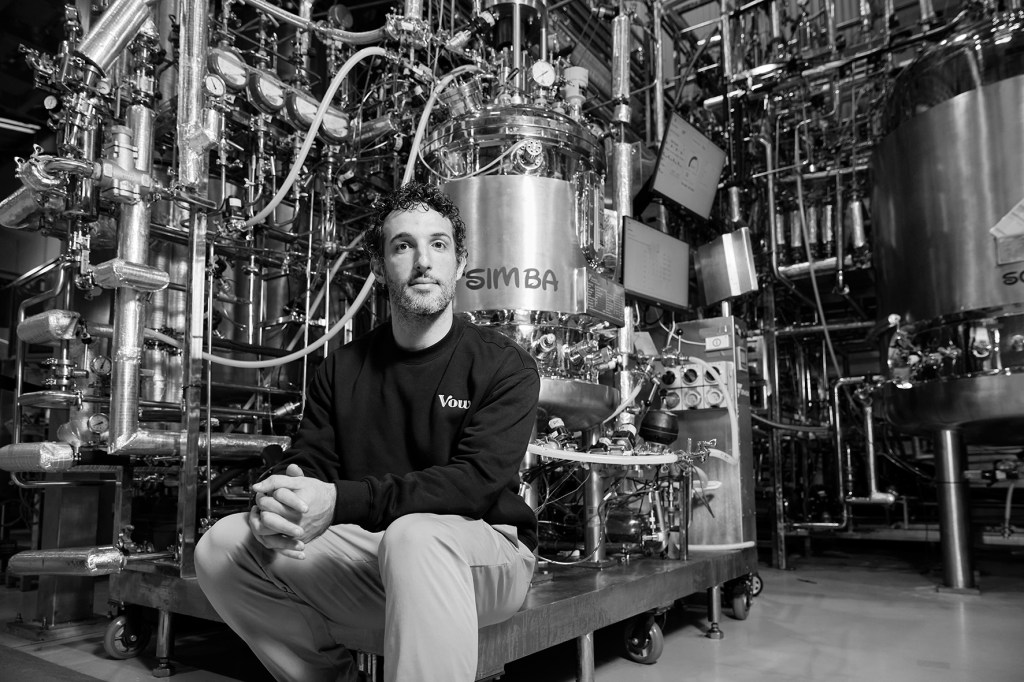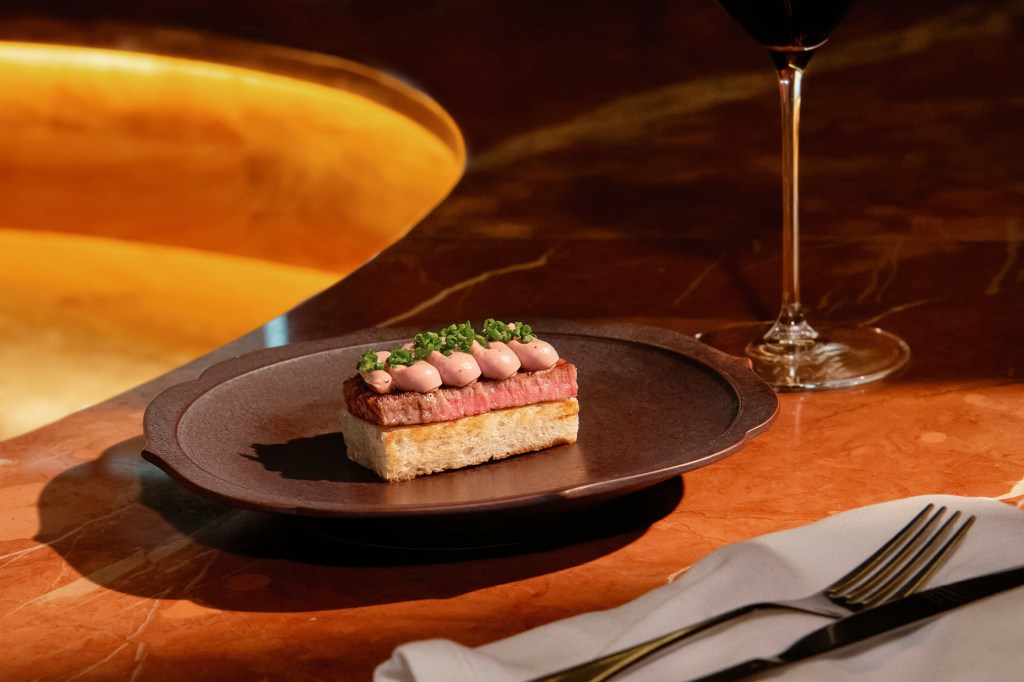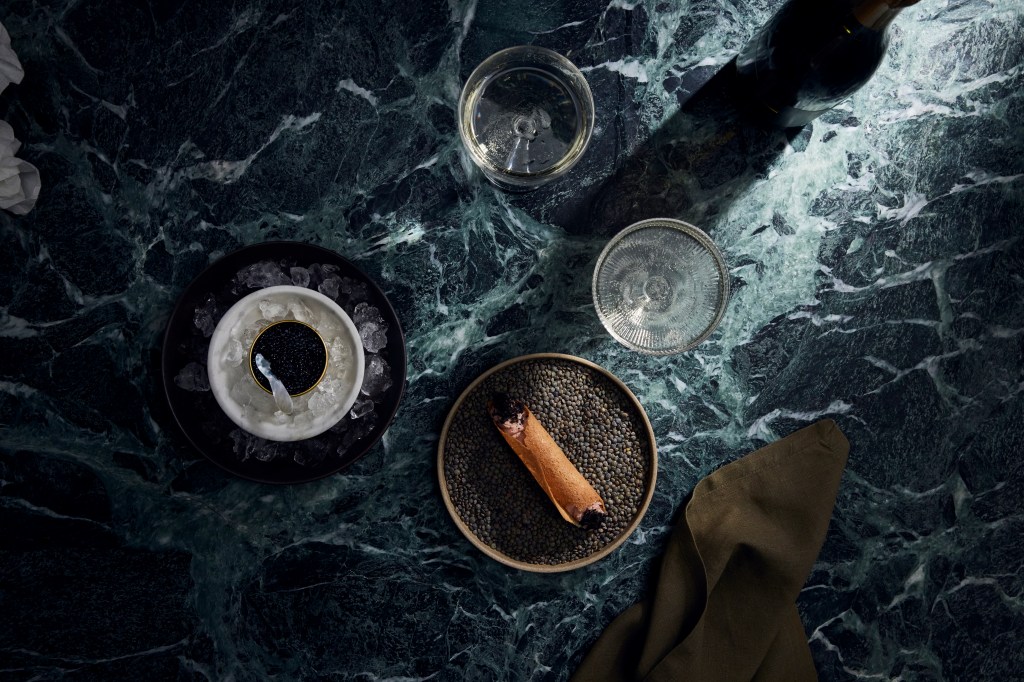George Peppou has worn many hats, including a chef’s toque. These days, he’s wearing a hair net in the lab at cultured meat start-up Vow. With a US$49 million capital raise behind the business and another in the works, Vow, recently launched in Singapore, is preparing for global expansion.
This story featured in Issue 12 of Forbes Australia. Tap here to secure your copy.

It calls itself the spaceship of the cultured meat industry, and with a product that’s more science than food, food-tech start-up Vow, which launched in 2019, probably lives up to its description.
The company, which was founded by Sydneysiders George Peppou and Tim Noakesmith (who exited the business in late 2022), is now the third of its kind to be approved globally to bring a cell based meat product to market – a cultured quail parfait under its Forged brand.
However, while other companies have received regulatory approval to sell their products, Vow is the only company currently selling cultivated meat anywhere in the world, according to the independent think tank Food Frontier.
Although the cultivated meat industry is still nascent, hype is increasing: start-ups in the sector attracted about US$400 million in investments in 2020 and a record US$1.4 billion in 2021. McKinsey forecasts the market will be worth about US$25 billion by 2030, but researchers suggest the cultivated meat industry could eventually be worth anywhere between US$200 billion and US$800 billion.
Peppou, a Greek-Australian from Sydney, saw the opportunity in the sector early on. He always had a thing for food and science, excelling in chemistry and hospitality in high school. In university, he’d pursue both. “It turns out chemistry secretly becomes maths after about two years, so I ended up studying biochemistry full-time and worked as a chef full-time.”
After graduating, he took on chef work in a few cafes and restaurants near Hornsby, NSW and did ‘staging’ (a French word for an unpaid internship) in fine dining restaurants, including Tetsuyas which recently closed. Then, Peppou found a gig as an inventor for US private equity firm Intellectual Ventures.
As someone who eats meat, I couldn’t imagine making that decision in a supermarket. ‘I want chicken, but I’ll have this different version of chicken’. It’s strange purchasing behaviour.
– George Peppou, founder, Vow
“It was a legitimate job, though I can’t overstate how weird it was,” Peppou says. “But its core philosophy was having non-experts look at problems differently.”
In his role, he’d get to work with clients in the Australian meat industry, like Horticulture Innovation Australia, gaining exposure to the broad problems in agriculture and different parts of the value chain.
“I was looking at how do you make more sustainable and, ultimately, socially equitable food? And it’s a really difficult problem. It can be tough to change the food system by trying to shape incumbents – it’s much more efficient just to build new ventures that enshrine these values from the beginning.”
His background in science, food and tech led Peppou to launch a start-up accelerator called GrowLab, which was exclusively for agricultural and food-tech businesses. Along the way, Peppou was accruing a niche set of knowledge about meat. That, plus a Greek heritage that makes meat-eating all but non-negotiable, led Peppou to look into launching his own food start-up.
“We wanted animal-like products that could be produced in a really small physical and environmental footprint,” he says. “Ultimately, that’s led to cultured meat.”
But Peppou didn’t set out to create meat that replicated what consumers already ate. Instead, he believed consumers like himself would be compelled to purchase cultured meat if it helped them achieve their goals. For example, if the substitute offered a decadent experience or, had a high protein or iron content or was convenient and cost-effective.
“Every company thinks, ‘How do you make chicken, beef or pork using this cell culture technology?’ As someone who eats meat, I couldn’t imagine making that decision in a supermarket. ‘I want chicken, but I’ll have this different version of chicken’. It’s strange purchasing behaviour.”
Vow’s approach to product development mimics that of the electric vehicle industry: start at the high end and, as the cost structure allows, move down towards the mass market.
“We’ve set out to create products at different price points, starting with high end, which is Forged in Singapore,” Peppou says.
The company is now working on other products, like its nutrition-focused brand, referred to internally as Amino, which sets out to beat animal meat on nutrition for those with specific needs around iron, omega-3s and protein. Mass-marketing will be the last step. But even the high-end brand is relatively cost-effective.
In April, Forged’s parfait was offered at Mandala Club’s Mori restaurant in Singapore as part of a $289 seven-course omakase menu with alcoholic drink pairings. For comparison, the first cultured beef burger was created at the Netherlands’ Maastricht University in 2013, costing US$350,000 and took two years to produce.

In its Alexandria, NSW facility, Vow has cut production from batch to harvest down to about four weeks (and harvest to sale takes one-to-two days). That’s much less than it takes to farm a cow, but in Peppou’s mind, that’s not the point.
“It’s, ‘How can we meet at least some of the demand for animal protein through production systems that have a small physical and environmental footprint, as opposed to intensifying animal agriculture?’ It’s about taking out some of the otherwise growth in factory farming, which is very high-emission and risky for public health, and instead deliver on some of that growth using a low-emission system like cultured meat.”
This kind of conviction and thinking led investors like Blackbird and Saudi Arabian venture capital fund Prosperity 7 to invest in the company’s US$49 million (AU$73.5 million) Series A in 2022. At the time, that was a record in the cultured meat industry. But Peppou jokes it was like trying to catch a falling knife.
“It was in the second half of 2022, which was not a super fun period in capital markets,” he says. “But the investors in our series had a broad thesis that food technology was a high-growth potential category, and they doubted the strategy others were taking.”
But cultured meat isn’t for the faint-hearted. It is capital intensive, though not necessarily in the ways Peppou expected. A large part of the cost comes from having to do most of the grunt work in-house, which means hiring top talent – and a lot of it.

Vow designs its own production equipment, has its own fabrication team, supply chain team, food processing team, logistics team, and marketing team, and has brought manufacturing in-house. But comparatively, Vow claims it has entered the market in around half the time its competitors took, with around 10% of the capital.
Within those teams, there are some heavy hitters. The chief operating officer is Ellen Dinsmoor, who’s from insurance company Lemonade in New York; the head of finance, Nick Barnes, is ex-Blackstone; the head of regulation and general counsel, Andrew Janis, used to run Uber’s legal and regulation in APAC. Crucially, the company’s head of manufacturing is ex-SpaceX Ines Lizaur.
“She’s seen some shit,” Peppou says. “She knows how to operate in a very chaotic scale-up environment. I have a lot of experience in my leadership team, which greatly helps.” Peppou also counts Robyn Denholm as an advisor.
The company is raising capital and claims it’s seeing momentum off the back of its Singapore launch. Peppou says the goal is to strike while the iron’s hot and prepare to launch in other markets. However, while the company is headquartered in Australia, this country is proving to be a tricky market to launch in.
We don’t want to alienate the people we’re trying to sell to – if anything, we want to alienate vegans and vegetarians because they already have a sustainable diet. They should just keep doing what they’re doing.
– George Peppou, founder, Vow
Food Standards Australia New Zealand (FSANZ), the regulatory body responsible for developing the nation’s food standards, is yet to approve Vow’s application to sell its cultured quail. It’s the first cultivated meat application to be accepted by the FSANZ, so Vow’s in uncharted waters. The process involves two calls for submissions, which focus on the efficacy of the food safety claims and the science behind the product.
Then there’s a potential expansion to the US, which has its risks, namely political ones.
“If there’s a Trump victory, what could that mean? There has been political pushback in places like Florida, a Republican-led state, about cultured meat. It’s a pure political punching bag, which is disappointing. We’re doing a lot of work with the FDA [Food and Drug Administration] but not necessarily banking on it as a market.”
Vow is also turning to the UK, Canada and other Asian markets like Korea and Japan, and hopes to enter the Middle East (it’s currently working on its Halal certification).
Peppou envisions cultured meat as a complementary product to animal agriculture rather than a competitor.
“Our goal is to give options to people that like eating meat and not shame them for their dietary choices,” he says, adding that he and the majority of the workplace eat meat regularly. “We don’t want to alienate the people we’re trying to sell to – if anything, we want to alienate vegans and vegetarians because they already have a sustainable diet. They should just keep doing what they’re doing.”
Even further ahead, Peppou sees Vow listed on the NASDAQ or NYSE as a global technology-
driven food business.
“There’s a long way to go, but we’ve also come a long way.”
Look back on the week that was with hand-picked articles from Australia and around the world. Sign up to the Forbes Australia newsletter here or become a member here.



